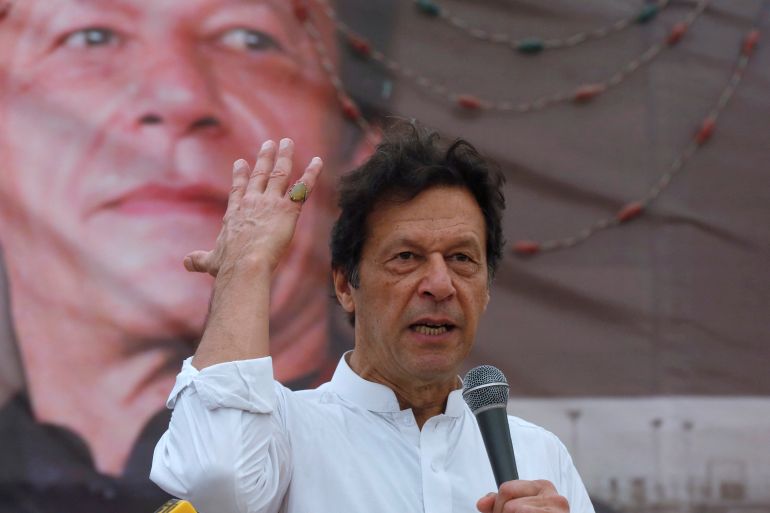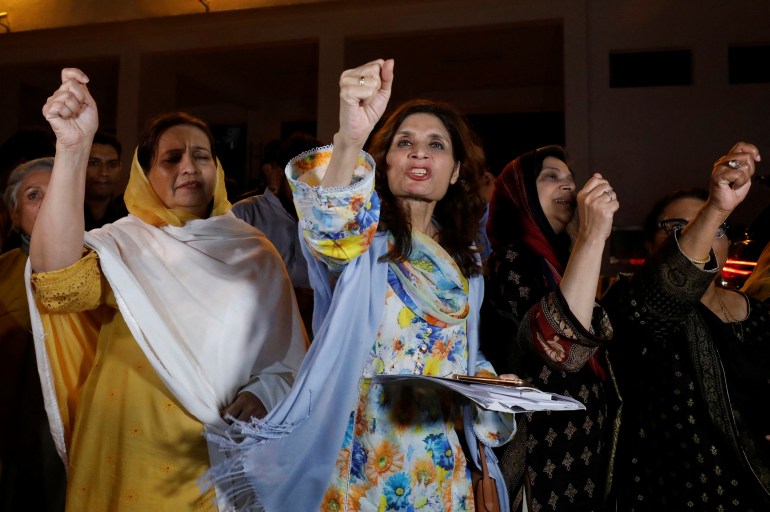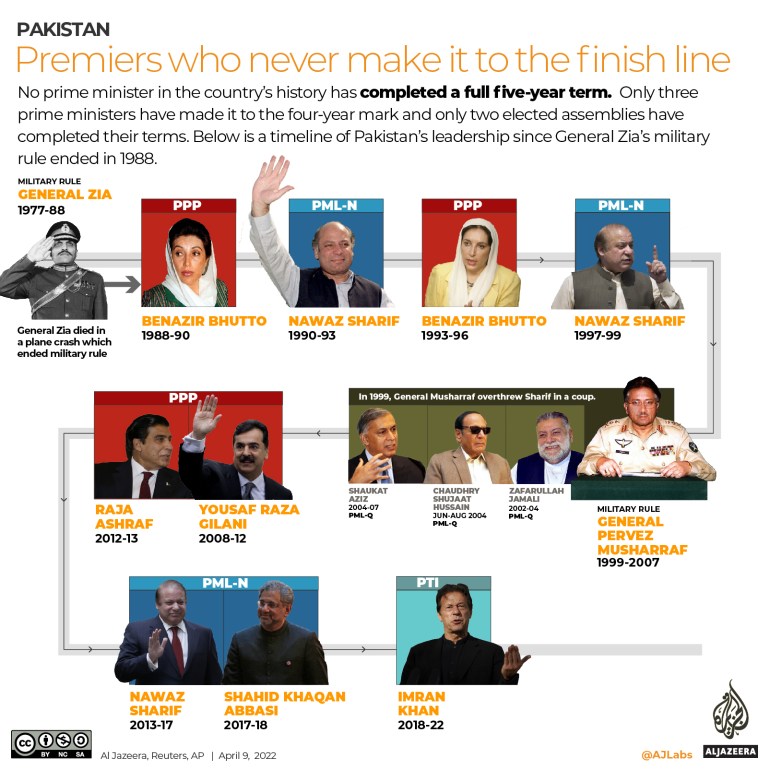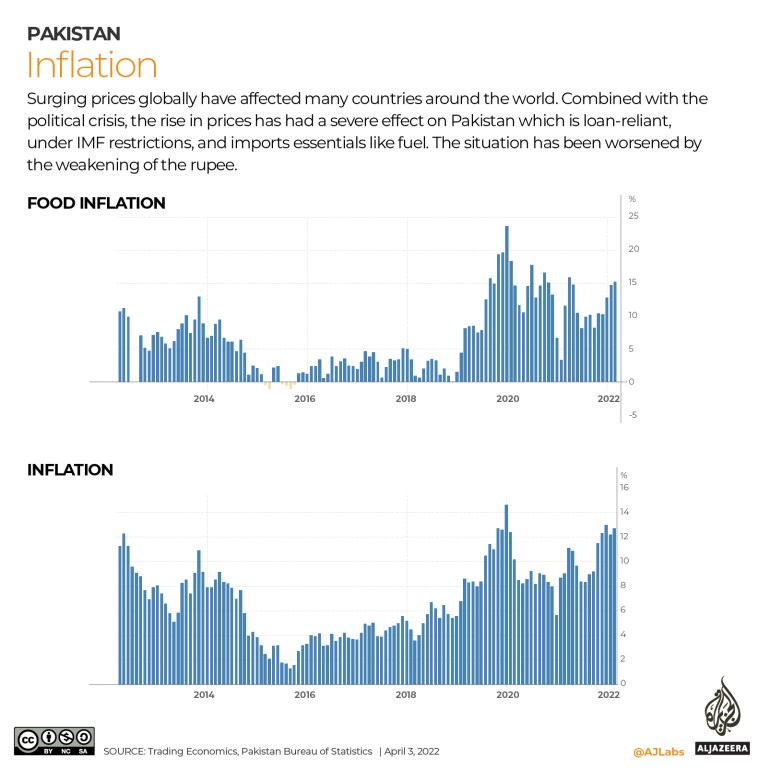What led to leader Imran Khan’s downfall in Pakistan?
Khan’s Pakistan Tehreek-e-Insaf party lost the support of coalition allies, denying a majority he needed to defeat a no-confidence vote.

Imran Khan’s tumultuous term as prime minister of Pakistan has ended, following weeks of high political drama and days of constitutional chaos.
The Supreme Court’s landmark verdict late on Thursday restored a parliament that Khan had sought to disband and mandated a vote of no confidence that he sought to avoid.
Keep reading
list of 4 itemsPakistan parliament to vote for new PM on Monday: Acting speaker
Pakistan: Key players behind PM Imran Khan’s removal
Who is Shehbaz Sharif, Pakistan’s new prime minister?
Khan was effectively left with a choice: resign or be voted out of office.

The former prime minister’s political demise was rooted in twin new realities. Inside parliament, Khan’s Pakistan Tehreek-e-Insaf (PTI) had lost the support of coalition allies, denying him the majority he needed to defeat the vote of no confidence.
Outside parliament, Khan appeared to lose the support of Pakistan’s powerful military, which the opposition alleged helped him win the 2018 general election, and had recently publicly fallen out with the prime minister over senior military appointments and policy decisions.
The PTI and the military have denied the allegations.
In recent weeks, as the principal opposition parties, the Pakistan People’s Party (PPP) and Pakistan Muslim League – Nawaz (PML-N), ramped up their efforts to dislodge Khan, coalition allies became vocal in their dissatisfaction with him.
“As far as governance was concerned, the government had totally failed,” said Senator Anwaar ul Haq Kakar of the Balochistan Awami Party (BAP), a coalition ally that withdrew support for Khan in late March.
“There was disgruntlement for the past two years,” Kakar added. “The party [BAP] was not happy about its share in the federal government and the ministerial portfolio it has been allocated.”

The sour mood among Khan’s erstwhile allies was echoed by Nadeem Afzal Chan, a special assistant to the prime minister who resigned his position and rejoined the opposition PPP in early March.
“I was impressed by Khan’s anti-corruption platform and was tired of the status quo,” Chan said. “But then I saw that while Khan publicly talked about the poor, privately he surrounded himself with wealthy investors.”
Economic distress
A deepening economic crisis contributed to dissatisfaction with Khan with double-digit inflation dogging much of his term.
In February, as opposition momentum against Khan built, the prime minister announced a cut in domestic fuel and electricity prices despite a global rise, pledging to freeze prices until the end of the fiscal year in June.
The move piled further pressure on Pakistan’s chronic fiscal deficit and balance-of-payment troubles. This week, the rupee fell to historic lows against the US dollar and the State Bank of Pakistan sharply increased interest rates in an emergency meeting.
“Part of it was the situation they inherited from the previous government and part of it was of course COVID,” said Shahrukh Wani, an economist at the Blavatnik School of Government, University of Oxford.
“But the government fell quickly into firefighting and reforms were never taken up.”

For former Khan allies such as Chan, discontent among constituency voters had tipped over. “Inflation, fertiliser shortages, local government in Punjab, policing, it had all got too much,” Chan said.
Inside parliament, the loss of the allies’ support reversed the numbers for Khan. BAP, the Muttahida Qaumi Movement (MQM) and Pakistan Muslim League – Quaid (PML-Q) account for fewer than five percent of the seats in the 342-member National Assembly.
But by pledging to support the no-confidence vote against Khan, the coalition allies effectively ended Khan’s three and a half year spell as prime minister. The opposition parties also claimed to have the support of a number of dissident PTI parliamentarians.
Meanwhile, the economy remains in a parlous state. Miftah Ismail, a former PML-N finance minister tipped to resume the post he held in 2018, said: “The two biggest economic challenges facing Pakistan at the moment are high inflation and fast depleting foreign exchange reserves.
“The difficulty is that as the currency has been devaluing due to decreasing reserves, it gives rise to even more inflation.”
Military’s role
With Khan’s exit confirmed, former allies are increasingly candid about the third rail of Pakistani politics: civil-military relations.
The prime minister’s parliamentary support began to dissolve when the military signalled it would not side with Khan against the opposition, a policy of so-called neutrality.
“When the establishment became neutral, the allies saw that the government wouldn’t survive,” Senator Kakar of BAP said. “Once the view was entrenched that he can’t stay, it was only a matter of time.”
Khan is the latest in a long line of Pakistani prime ministers who have fallen out with the military over key appointments and foreign policy.
In October, simmering civil-military tensions exploded in public view when Khan tried to retain Lieutenant-General Faiz Hameed as the military spy chief, rejecting the nominee of army chief General Qamar Bajwa.
General Bajwa’s nominee, Lieutenant-General Nadeem Anjum, was eventually appointed as the new director general of Inter-Services Intelligence, but the weeks-long standoff was bruising and ominous.
General Bajwa’s second term as army chief will end in November, with General Hameed one of the senior-most generals eligible to replace him. The Pakistani prime minister appoints the army chief.
Extraordinary, too, was Khan’s attempt to recast ties with the US, Pakistan’s largest trading partner and a fractious ally that the military has sought to maintain as an important partner.
In February, in pursuit of what Khan described as a neutral foreign policy, Khan travelled to Russia seeking trade deals on the eve of the Russian invasion of Ukraine. He left with only a handshake from Russian President Vladimir Putin hours after the attack began on February 24.
While the Pakistani military backed Khan’s Moscow trip, differences intensified after Khan made a high-stakes domestic pivot. Faced with defeat in the no-confidence vote in parliament, Khan alleged a US-led plot to remove him as punishment for his Russia trip and neutral foreign policy.
As evidence of the plot, Khan waved a letter in a public rally in Islamabad on March 27, claiming the US had delivered a diplomatic warning to Pakistan to remove him as prime minister.
The diplomatic missive, the alleged US threat, and Khan’s claim that the no-confidence was part of a US-led conspiracy roiled Pakistani politics and civil-military relations.
Retired Major-General Athar Abbas, a former military spokesperson and Pakistan’s Ambassador to Ukraine from 2015 to 2018, said: “The letter warranted a strong response and corrective measures. Response [in the military] is mixed on whether it should have been used to meddle with the vote of no confidence.”
General Abbas also described a number of differences between Khan and the military leadership that had accumulated over Khan’s time in office, including poor political and economic management by Khan that was acting as a drag on the military’s public image.
On Khan’s opposition to military operations inside Pakistan and US-led wars internationally since the September 11 attacks, General Abbas said: “PM’s position on war on terror is that we fought America’s war and suffered loss of men and material. Military’s view was that it was the fallout of the Afghan war and we had no choice.
“Pressure on military leadership is if it was America’s war, then all the sacrifices of young officers and soldiers were a waste,” Abbas said.
Another retired military official, Air Vice-Marshal Shahzad Chaudhry, suggested the tensions with the military also concerned Khan’s style of governing.
“On policy matters, Khan could be mercurial. There was no predictability or stability. Imran Khan is a populist, that’s his vulnerability too.”
Defeated inside parliament and undone outside, Khan though is unlikely to be a spent force politically. The cyclical nature of Pakistani politics has seen former prime ministers rebound before.
Khan also has the advantage of clawing his way back to power from a fertile political base.
Chan, the former special assistant to the prime minister, said, “A month ago, people were abusing [Khan and the PTI government] for inflation.
“Now, they say he’s stood up for a proud and independent Pakistan.”